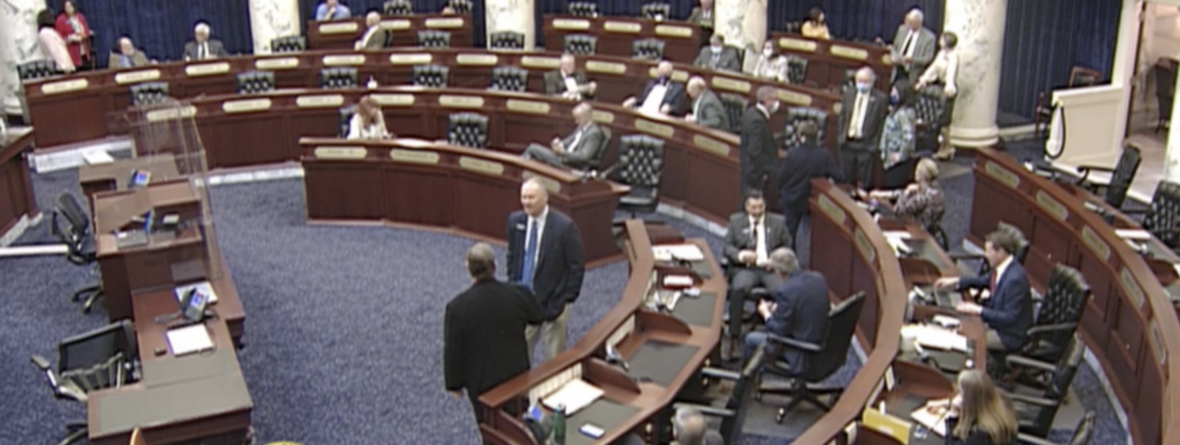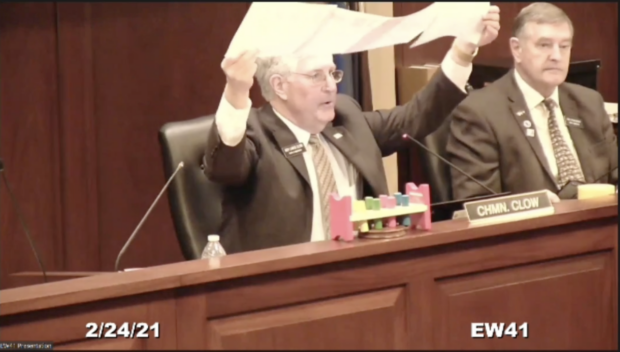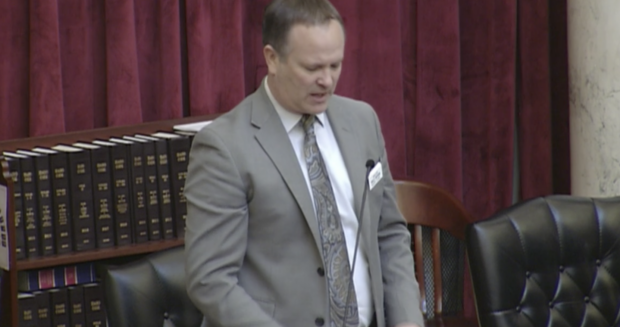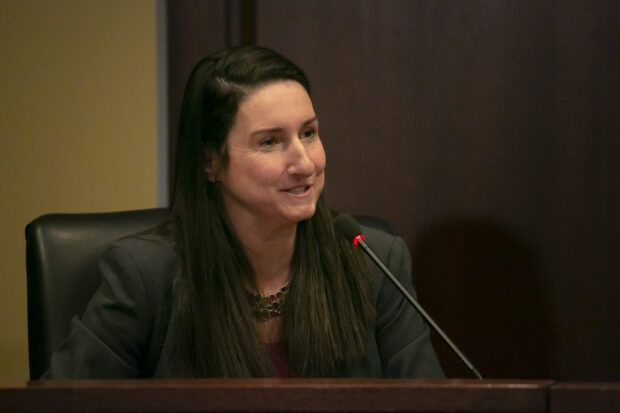This article was originally written by Kevin Richert for IdahoEdNews.org on March 25, 2021.

No one seems to know what will happen starting April 6, when legislators return to the Statehouse after an 18-day pandemic recess.
Fitting, isn’t it? Shouldn’t an unprecedented session culminate in an unpredictable finish?
But if you care about early education and all-day kindergarten, grants for cash-strapped parents, guns in schools or sex education, unpredictable is a maddening thing. Especially when some bills, such as all-day kindergarten, border on the historic.
Lawmakers left all these issues dangling, among many others, when they abruptly left town Friday, in the middle of a Statehouse coronavirus outbreak. What will they take up next month? Or drop?
“I’m trying hard to have no expectations going into (April) sixth,” said Quinn Perry of the Idaho School Boards Association.

“It’s going to be a little bit of a mystery,” said Rep. Lance Clow, R-Twin Falls.
If anyone should be in the loop, it’s Clow, chairman of the House Education Committee. But Clow should be excused for playing catchup: He was among at least six House members who contracted coronavirus over the past two weeks, prompting the recess.
Sorting out the priorities
The one thing the Legislature must do next month is set a budget. Lawmakers left a lot of unfinished business here. Both houses still have to pass the K-12 budgets. The higher education budget still has to pass the House. Those two budgets alone account for close to 60 percent of the state’s general fund. “That’s a pretty significant chunk,” said Rep. Wendy Horman, R-Idaho Falls, a veteran member of the Joint Finance-Appropriations Committee.
Even if the Legislature could — or should — return to Boise in wrapup mode, that doesn’t mean the higher ed budget is greased. House conservatives killed two higher education budgets in March 2020, gumming up adjournment at the dawn of the pandemic. These same conservatives are likely to fight this year’s budget. In a quest to rein in what they consider rampant social justice on campus, they might not be appeased by shifting $409,000 from Boise State University to Lewis-Clark State College.
Sen. Carl Crabtree realizes the higher ed budget is under scrutiny. But Crabtree, a Grangeville Republican who crafted the spending plan that comfortably passed the Senate, believes his budget sends a message to college and university leaders without inflicting permanent damage. “You don’t have to decapitate the kid because their hand is dirty,” he said Wednesday.
The budgets are a must-do — the state Constitution requires it. But for many lawmakers, tax relief and a transportation package might as well be constitutionally mandated. The House passed a $389.4 million tax cut and rebate plan last week along party lines, but the Senate hasn’t touched it yet. That debate is just beginning.

On the Senate floor Friday, Majority Leader Kelly Anthon admonished lawmakers to come back in April ready to tackle the important unresolved issues, such as tax cuts and transportation. At roughly the same time Friday, House Speaker Scott Bedke told reporters that the Legislature would still deal with bills in the pipeline. “We need to emphasize that none of the things will be left undone, it just presses pause,” he said.
No wonder things are confusing. There’s ample room for interpretation here. But then again, the Legislature has never been forced to shut down for this long, this late in a session.
What’s at play
The unprecedented situation leaves a long list of education bills in limbo:
Early childhood programs. This isn’t a must-pass budget bill. But without the Legislature’s approval, the State Board of Education can’t spend a three-year, $6 million federal grant. Last week, JFAC rewrote the bill with restrictions designed to appease some of the House conservatives who rejected the first version of the bill. Since the House deadlocked on that bill on March 2, it wouldn’t take much of a vote swing to get this bill to the Senate, which would presumably be more receptive.
Sex education. The House has already passed a bill allowing parental “opt-in” on sex ed. It was scheduled for a Senate Education Committee hearing, before the recess got in the way.
Guns in schools. Two bills are sitting in the Senate State Affairs Committee. One — which would allow bill school employees with an enhanced concealed weapons permit to carry a firearm in school, without trustees’ approval — has already passed the House.
“Racist and sexist concepts.” In the rush before recess, House Education hastily introduced three bills Friday, including one to prohibit public schools from teaching “racist and sexist concepts.” Democrats boycotted the committee meeting in protest. Clow — who missed Friday’s meeting while self-isolating — was caught off guard. “None of those bills did I see coming,” he said Wednesday. Clow wouldn’t say whether he would bring these bills back for a full hearing.
Full-day kindergarten. Crabtree and Rep. Judy Boyle, R-Midvale, are pushing to allow school districts to use state money for all-day kindergarten, in hopes of moving this cost off of short-term property tax levies. They’re working on a rewrite of the bill. Bedke wants that rewrite to get a hearing in House Education right after the recess, and on Wednesday, Clow said he’s receptive.
Parent grants. The Senate is poised to vote on a sequel of sorts to Gov. Brad Little’s Strong Families, Strong Students education grant program. But at the behest of the sponsors, senators yanked out controversial language to create a private school scholarship program. If the Senate passes the amended bill, the House has to approve the changes.
A recess — and then an endgame

There’s still time. This week, Horman and Senate Minority Leader Michelle Stennett both said the Legislature might remain in session through late April. On Tuesday, House Minority Leader Ilana Rubel predicted a possible impasse on tax relief, and pointed to the long list of budget bills still on the docket. “There is a lot of stuff we still have to do,” said Rubel, D-Boise. “That could keep us there for a while.”
Lawmakers are approaching the unexpected recess differently.
A co-sponsor of the parent grant bill, Horman said she is spending the break working the phone and lobbying senators, and working off of Bedke’s directive that the session is just on pause. “That’s what I’m going with.”
Reached by phone on Wednesday, Crabtree was spending a windy morning on break, running cattle on the Camas Prairie. He’d like to get a historic all-day kindergarten funding bill through the Legislature, but he’s also trying to give his colleagues their downtime. “I think everybody’s pretty stressed and fatigued, and I’d be among that group,” he said. “We’re sick of each other.”
In Boise, Rod Gramer of Idaho Business for Education is gearing up for a historic April. And he’s observed enough sessions to know that great things, or bad things, can happen in the rush to adjournment.
An all-day kindergarten bill, he said, would be as significant as the 1975 law creating kindergarten in the first place. “If we can get it through, let’s get it through.”
But while IBE strongly supports all-day kindergarten, the group also strongly opposes Horman’s grant bill. The bill would allow parents to use grant money for private school tuition and fees — defying 130 years of state policy and Idaho’s Constitution, Gramer says. “(It) should give everybody pause.”
Anything can happen.
But if you’ve spent any time watching the Legislature the past 12 months, you’re familiar with that.
Each week, Kevin Richert writes an analysis on education policy and education politics. Look for it every Thursday.



